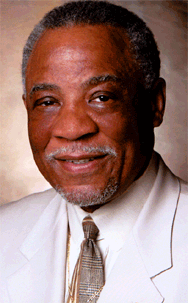| |

|
|
Recognizing
the “Mighty 42”
By Rev. Dr. W. Wilson Goode, Sr.
As the Amachi program prepares to celebrate its fifth anniversary, it
is appropriate to salute the people who are not only unique, but who have
been the prime reason for its amazing success. I refer to the pastors
of the original churches who were trailblazers in this work. I call them
the “Mighty 42.” These were the 42 congregations that joined
forces with Public/Private Ventures (P/PV) and Big Brothers Big Sisters
to create this awesome national model.
As we celebrate the many achievements of this program, it’s important
to reflect on some of the reasons for the involvement of the churches.
Some saw it as a call to arms. “It was like a wake-up call for us,”
one pastor said. “It made the church aware of what we need to do
as a church.” And, they believed, it could help awaken congregation
members to turn their faith into action. By making the commitment to mentor
a child, one pastor said, “The people in the church get to practice
what is preached, what they testify about. The sermon is okay. But the
practical side, forgive me Lord, it is a powerful teacher.”
This statement was support by another pastor who immediately grasped the
mission of the program and said, “We had prison outreach and youth
study groups. But when Rev. Goode came to see me, I immediately recognized
that in our mission we had totally overlooked one group and their particular
needs. Sometimes you don’t see the innocent victims.”
But there was a deeper reason for some pastors and congregations to come
forward— some suggest that it was really to extend and expand their
neighborhood ministries. One pastor put it in perspective this way: “It
was a program that brought its own support. It gave us resources, manpower,
to extend what we were doing. Amachi did the organizing for us.”
Or, in the words of another pastor, it provided the church with “the
ability to go into the community in a systematic form and reach children
that need support and guidance.”
This program enabled this congregation to extend its ministry to a population
that was described by another pastor as “a faceless, voiceless group
that nobody has been speaking up for.”
The program also had [a built-in] accountability. Every month, each volunteer
was expected to turn in a report on [his or her] match experiences. After
the receipt of the monthly reports by Amachi staff, each pastor was sent
a report on all the volunteers in the congregations. The pastor also received
a report indicating how the congregations compared to other congregations.
These reports, especially the comparison ones, had their own built-in
accountability. As one pastor explained, “There was one month when
I got the report and the numbers were very low. I actually stood up on
the pulpit [during his Sunday sermon] and said I was [a]shamed.”
When he got his report the next month, he said, “The numbers were
better.”
So as we now celebrate 108 Amachi programs in 85 cities and 35 states,
with about 20,000 children served, this is a tip of the hat to those brave
and passionate pastors, the “Mighty 42,” who made it all possible.
|
|





